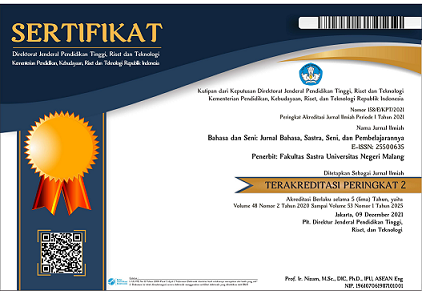The impact of women’s roles in the preservation of nature: Analysis of ecofeminism on Ronggeng Dukuh Paruk
Abstract
The roots of the catastrophe, environmental pollution, and the decline in culture are the empirical assumptions of positivistic humans. A strategy of deconstructing and reconstructing the epistemological framework of knowledge is needed through the creation (counter) of a positivistic view that can determine the attitudes and roles of a person, both men and women, towards the environment. On this basis, this article aimed to explain women's role in preserving nature as a critical analysis of the ecological perspectives of literary texts. This research utilized qualitative descriptive and ecofeminist methods in the eco-criticism discourse. The ecofeminist method refers to methods related to environmental science, especially methods related to the preservation (conservation) of nature and culture, which are associated with the role of women in literary works related to research. The primary data was the excerpts of Ronggeng Dukuh Paruk by Ahmad Thohari. Based on the analysis, it can be explained that the role of women impacts him. The impact of women's roles in conservation consists of two things, namely, positive impacts and negative impacts. This article contributes to the humanities and the foundation for applied research, such as using literature from an environmental perspective.
Dampak peran perempuan dalam pelestarian lingkungan: Analisa ekofeminisme dalam karya sastra Ronggeng Dukuh Paruk
Akar dari krisis dan pencemaran lingkungan serta menurunnya kultur budaya adalah asumsi-asumsi empiris positivistik manusianya. Diperlukan strategi dekonstruksi terhadap kerangka epistimologis pengetahuan, dan kemudian merekonstruksinya, salah satunya melalui penciptaan (counter) pandangan positivistik yang dapat menentukan sikap dan peran seseorang, baik laki-laki maupun perempuan terhadap lingkungan. Berdasar hal tersebut, artikel ini bertujuan untuk mengeksplanasi dampak peran perempuan dalam pelestarian lingkungan sebagai telaah kritis wacana teks sastra berperspektif lingkungan. Penelitian ini menggunakan metode deskriptif kualitatif dengan pendekatan ekofeminisme dalam wacana ekokritik, yaitu pendekatan yang berkaitan dengan ilmu lingkungan khususnya pelestarian (konservasi) alam maupun budaya yang dihubungkan dengan peran dan studi perempuan dalam teks karya sastra. Data dari penelitian ini adalah potongan-potongan cerita yang diambil dari novel Ronggeng Dukuh Paruk Karya Ahmad Tohari. Berdasar analisis, dapat dijelaskan bahwa peran perempuan membawa dampak atas dirinya. Dampak peran perempuan terhadap pelestarian terdiri atas dua hal yakni dampak positif dan dampak negatif. Tulisan ini memberikan berkontribusi untuk ilmu humaniora sekaligus sebagai pondasi dan landasan penelitian terapan seperti pemanfaatan karya sastra berperspektif lingkungan.
Full Text:
PDFReferences
Alexander, R. (2003). Resisting Imposed Metaphors of Value: Vandana Shiva’s Role in Supporting Third World Agriculture. The Online Journal Metaphorik, 4, 6–29.
Andersen, M. H. (1988). Thinking About Women: Sociological and Feminist Persfektives. Mac-millang Publicing Co Inc. Highlight.
Bonnett, M. (2017). Environmental Consciousness, Sustainability, and the Character of Philos-ophy of Education. Stud Philos Educ, 36, 333–347.
Candraningrum, D. (2013). Ekofeminisme dalam tafsir Agama, Pendidikan, Ekonomi, dan Bu-daya. Jalasutra.
Jabrohim. (1994). Teori Penelitian Sastra. Masyarakat Poetika Indonesia IKIP Muhammadiyah Yogyakarta.
Kayam, U. (1988). Memahami Roman Indonesia Modern sebagai Pencerminan Ekspresidan Masyarakat dan Budaya Indonesia Suatu Refleksi. In Menjelang Teori dan Kritik Susastra Indonesia yang Relevan. Angkasa.
Keulartz, J. (2007). Using Metaphors in Restoring Nature. Nature & Culture, 2(1), 27–48.
Krishnakumar, & Jayakuma. (2011). Developing Teaching Material for E-learning Environ-ment. Journal of Education and Practice, 2(8).
Krishnasamy K. (2018). Ecocriticism Good Significance in Literature and Environment. OSR Journal of Humanities and Social Science (IOSR-JHSS), 55–56.
Kronlid, D. (2003). Ecofeminism and Environmental Ethics. An Analysis of Ecofeminist Ethical Theory. Uppsala Studies in Social Ethics, 28(227).
Qomariyah, U’um. (2022). Sastra Bandingan: Kajian Teoretis, Eksploratis, dan Metodologis. Sumatera Barat: Insan Cendekia Mandiri.
Qomariyah, U. (2013). Potret Investasi Perempuan Berbasis Kearifan Lokal: Studi Ecofeminis Novel Primadona Karya Ahmad Munif. Jurnal Lingua, IX(1), 54–60.
Ruthven, K. K. (1990). Feminist Literaty Studies: An Introduction. Cambridge University Press.
Sharnappa, P. S. (2016). Reconstructing Ecofeminism: A Study of Kamala Markandaya’s Nec-tar in a Sieve. Cogent Social Sciences, 2(1243772).
Shiva, V. (1990). Development as a new project of Western Patriarchy. In I. Diamond & G. F. Orenstein (Eds.), Reweaving the World: The Emergence of Ecofeminism. Sierra Club Book.
Shiva, V., & Mies, M. (2005). Ecofeminism Perspektif Gerakan Perempuan dan Lingkungan. IRE Press.
Wellek, R., & Warren, A. (1989). Teori Kesusasteraan. Gramedia.
DOI: http://dx.doi.org/10.17977/um015v52i12024p1
Refbacks
- There are currently no refbacks.

This work is licensed under a Creative Commons Attribution 4.0 International License.

Dear Sir/Madam
We appreciate your continued confidence and trust in Bahasa dan Seni: Jurnal Bahasa, Sastra, Seni, dan Pengajarannya (JBS). In order to enhance the service, readability, and quality of JBS publications, we will be transitioning to a new website, https://citeus.um.ac.id/jbs, in collaboration with Digital Commons (Elsevier) starting in July 2024.
Sincerely
Yusuf Hanafi
(Editor in chief)
















2.png)